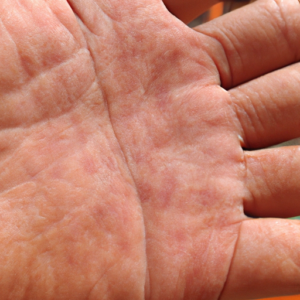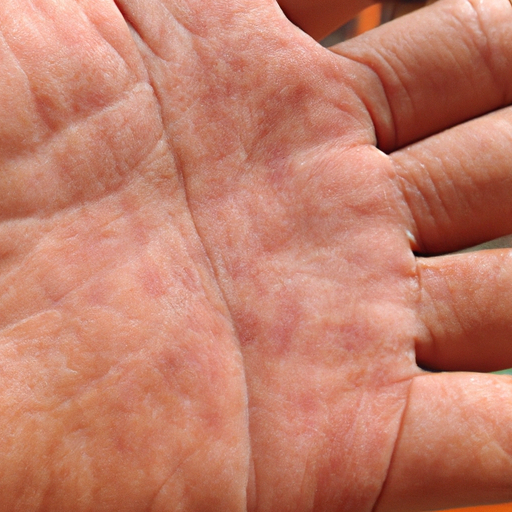Introduction
Hey folks! I’m here to talk to you a little bit about eczema. Eczema is an itchy, inflammatory skin condition that affects nearly 15 million Americans. There are several different types of eczema, and even more possible causes, symptoms, treatments, and preventative measures. It’s important to understand each one if you or someone you know is struggling with eczema.
Causes of Eczema
It’s no mystery why so many folks are trying to figure out the cause of their eczema. It can be a real drag when you’re itching and scratching like crazy, and you don’t know what the heck it’s from. Lucky for ya, I’m here to shed some light on the subject and help you understand what might be behind your eczema.
First things first: doctors still aren’t 100% sure what causes eczema, unfortunately. We do know that genetics plays a role in your chances of getting it—meaning if a family member has it, you may be more likely to get it too. But that isn’t the full story.
If genetics is the ‘what’, then all the other factors like environment (especially in the winter months), diet, stress levels and even skin care can be considered the ‘when’. Basically, these things can all affect how often you experience flare-ups. And let’s face it, nobody’s having any fun when they’re dealing with major redness and immense itching.
Another important thing to know is that there are different classes of eczema. One kind, atopic dermatitis, is pretty common, especially for kids. Scientists believe the immune system is often involved in this kind. So, if your allergies are off the charts, that could play into your eczema journey.

Then there’s contact dermatitis, which usually happens after your skin comes into contact with certain allergens, like pollen or pet dander. And lastly, there’s dyshidrotic eczema. This one’s super weird; it often shows up as tiny bumps filled with fluid on the hands and feet. As to why this occurs, we’re honestly stumped.
So, you can see where experts are coming from when they say that the exact cause of eczema is a bit of a head-scratcher. That said, you shouldn’t feel helpless. Once you get diagnosed, proper treatment can really make a difference in managing your symptoms.
Symptoms of Eczema
Eczema can manifest itself in a variety of ways. The most common symptom is itchy, dry skin that may become red and irritated. Other signs include: leathery or scaly patches of skin, bumps that may ooze or crust over if scratched, small patches of discoloration, cracking, flaking, and blisters.
Other forms of eczema have different symptoms. For example, infantile eczema is often characterized by very dry skin with tiny bumps that resemble pimples; whereas contact dermatitis results in a red rash when exposed to certain irritants.
Regardless of the type of eczema, it is generally characterized by recurring episodes which can last for long periods of time and can vary in severity. It may be mild, causing little discomfort; or severe, resulting in intense itching, burning or even pain.
Keep in mind, sometimes other conditions may share similar symptoms with eczema. If you experience any type of skin irritation, it’s always best to consult with your doctor to get an accurate diagnosis.
Diagnosis of Eczema
Eczema can sometimes be tough to diagnose since its symptoms are similar to other skin conditions. That’s why it’s important to get a professional opinion from an experienced doctor or dermatologist.
The first thing they’ll do is take a look at your skin and ask questions about your medical history and family history, as well as any medication you might be taking. It’s helpful to jot down any recent changes in your environment or lifestyle that could have triggered the rash. If not, they may perform an allergy test, perform a biopsy, or even order blood tests if more conclusive results are needed.
Sometimes, all this fuss might seem overwhelming, but think of it as an investment in getting to the bottom of what’s causing your rash. After all, doctors rarely take these steps lightly – they’re doing it to make sure you get the help you need.
So don’t hesitate to get checked out if you suspect you have eczema. Your doc will figure out the right diagnosis and plan the best course of treatment for you.
Treatment Options for Eczema
When it comes to treating eczema, everyone’s gotta find what’s best for them. Unfortunately, there ain’t no golden ticket or easy answer – just lots of different options to give a whirl ‘til you find somethin’ that works. From moisturizers to prescription creams to sometimes even surgery, here’s a list of some of the ways to help control that pesky eczema.
First things first: hydrate! Your skin needs a whole lotta water and moisture in order to fight off the itchiness and rash that accompanies eczema symptoms. That means choosing products with plenty of oils, like mineral oil, petroleum jelly, or even natural butters like shea or cocoa. You also might consider investing in a humidifier too – runnin’ it throughout the day can do wonders for your skin’s hydration levels.
If moisturizing isn’t cutting it alone, medicated ointments and creams might be the next step. Medications usually contain hydrocortisone, a steroid that reduces inflammation, redness, and itchiness. Lotions and creams containing coal tar can also be prescribed to help with the itchy stuff. And if all else fails, oral antibiotics may be an option as well.
It’s also important to note that sunscreen is an absolute must when it comes to eczema treatment. The sun’s rays can easily agitate already sensitive skin, so it’s important to choose sunscreens with exposed UVA and UVB protection. Keep in mind that certain medications can make your skin more susceptible to sunburns, so be sure to layer on the sunscreen real thick.
Finally, if eczema symptoms are still giving you trouble, light therapy (aka phototherapy) is another option. This process involves exposing your skin to certain types of light, which can help kill off bacteria, reducing inflammation and irritation. But of course, this should only be done under the direction of a doctor.
Lookin’ for something else? Laser therapies and surgical excision are some other options, although they require extra special care and guidance from a professional. So basically, there’s a bunch of options to try, so don’t sweat it – find something that works for ya!
Prevention Tips for Eczema
As someone who’s been there, I can tell you that the best way to prevent eczema is to avoid its triggers. Those can range from environmental factors like dust and pollen to certain foods or even anxiety. Whenever possible, avoiding those triggers is your first line of defense.
Your second line of defense is to keep your skin moisturized. Dry, itchy skin is a common symptom of eczema, so keeping your skin healthy and hydrated is key. Look for a fragrance-free, light lotion to avoid any potential irritants.
If you know you’re going to be exposed to something that could potentially trigger an outbreak, don’t go in without protection! Investing in some basic protective clothing, like gloves, sleeves and pants, can go a long way when it comes to avoiding unwanted flare-ups.
Finally, try to keep stress levels low. Stress can make existing eczema worse, so taking time out for yourself and focusing on relaxation exercises is an important part of eczema prevention. Whether it’s yoga, meditation, or just taking a few moments to sit back and relax, carving out a bit of “me-time” can help keep your eczema at bay.
Conclusion
When it comes to dealing with eczema, it pays to be prepared. You should know what causes flare-ups, how to recognize the symptoms, and when to get in touch with a healthcare provider. Whenever possible, taking steps to prevent eczema is the best way to go—it’ll save you time, money, and maybe even some stress. That’s why taking preventive measures like limiting bath frequency and moisture exposure, using mild cleansers, avoiding harsh detergents and soaps, and wearing loose clothing can make all the difference. And if you suffer from eczema, there are plenty of treatment options available—from topical creams and ointments to ultraviolet light therapy and systemic medications.
Eczema can be a nuisance, but with knowledge and the right approach, you can manage your condition and find relief. So don’t be afraid to ask questions, do your research, and get the help you need to keep your skin healthy.
Skin Condition FAQs
What is the main cause of eczema?
It’s hard to pinpoint the exact cause of eczema, but there are a few key factors. For starters, it often has something to do with a person’s immune system being out of whack. When your immune system is not functioning properly, it can lead to eczema. Additionally, genetics can play a role, with some people more prone to developing it than others. Moreover, environmental factors, such as exposure to certain irritants like dust, pollen and animal dander, can exacerbate eczema or even trigger a flare-up.
At the end of the day, eczema is really a multi-faceted issue and the root cause can vary from person to person. Severe cases may require a prescription from a doctor or dermatologist. But, regardless of the cause, it’s important to practice good skin care, such as using a mild, fragrance-free moisturizer and avoiding harsh soaps and lotions. That, plus a healthy lifestyle and the right therapies, can go a long way in mitigating the effects of eczema.
What race is eczema most common in?
As a journalist, I can confidently say that eczema is most widely seen in people of African, Asian, and Hispanic descent. It’s significantly more common in children, with about 10-20% of the population dealing with eczema. But no matter what race or age, eczema needs to be addressed early and aggressively, as it can quickly become debilitating and difficult to treat.
It’s important to know that eczema is a chronic skin disease, meaning it’s not going away on its own. And while triggers vary from person to person – such as allergens, dust mites, mold, pet dander, and stress – they usually manifest as an itchy, red, and scaly rash. The best way to manage it is to keep the skin moisturized, avoid irritants, and start a treatment plan right away.
It’s also important to note that in some cases, people with eczema can develop a secondary infection, which can make the symptoms worse and harder to treat. That’s why I recommend seeing a dermatologist if you’re seeing any signs of eczema and getting expert advice on how to manage it.
How common is eczema in the world?
It’s estimated that around 30 million Americans suffer from eczema, and while that number may be smaller in other countries around the world, it’s still a major issue globally. According to the World Allergy Organization, eczema is the fifth most common skin disorder that affects people of all ages, races, and countries. In some parts of Asia and Africa, eczema can affect as much as 40 percent of the population. The symptoms of eczema vary, so it’s important to see a healthcare professional if you’re experiencing any of the itching, redness, swelling, or other skin reactions associated with the condition.
In addition to being common, eczema can be chronic, meaning it can last for months or years and require ongoing treatment. While there’s no cure for eczema, there are ways to manage the condition, such as avoiding triggers, using moisturizers, and taking special medications. In some cases, lifestyle changes may also help, such as eating a healthy diet, getting plenty of rest, and managing stress levels.
In short, eczema is a very common condition around the world, and it’s important to discuss its symptoms and treatments with your doctor. With the right approach, you can help keep your skin healthy and reduce any potential flare-ups.
